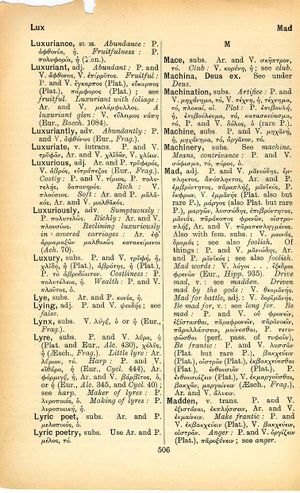lynx
οὐκ ἐπιλογιζόμενος ὅτι ἅμα μὲν ὀδύρῃ τὴν ἀναισθησίαν, ἅμα δὲ ἀλγεῖς ἐπὶ σήψεσι καὶ στερήσει τῶν ἡδέων, ὥσπερ εἰς ἕτερον ζῆν ἀποθανούμενος, ἀλλ᾿ οὐκ εἰς παντελῆ μεταβαλῶν ἀναισθησίαν καὶ τὴν αὐτὴν τῇ πρὸ τῆς γενέσεως → you do not consider that you are at one and the same time lamenting your want of sensation, and pained at the idea of your rotting away, and of being deprived of what is pleasant, as if you are to die and live in another state, and not to pass into insensibility complete, and the same as that before you were born
English > Greek (Woodhouse)
substantive
V. λύγξ, ὁ or ἡ (Eur., Fragment).
Latin > English (Lewis & Short)
lynx: lyncis, com., = λύγξ,
I a lynx: lynces Bacchi variae (Bacchus was drawn by a team of lynxes), Verg. G. 3, 264: maculosae tegmine lyncis, id. A. 1, 323: lyncibus ad caelum vecta Ariadna tuis, Prop. 3, 15, 8 (4, 16, 18): colla lyncum, Ov. M. 4, 25: timidos agitare lyncas, Hor. C. 2, 13, 40: dejectus lyncis, a lynx-skin, Stat. Th. 4, 272.
Latin > French (Gaffiot 2016)
lynx,¹³ cis, acc. as, f. (λύγξ), lynx : Virg. G. 3, 264 || m., Hor. O. 2, 13, 40, cf. Prisc. Gramm. 6, 5 || on lui attribuait une vue plus perçante qu’aux autres animaux : Plin. 28, 122.
Latin > German (Georges)
lynx, cis, Akk. Plur. cas, c. (λύγξ), der Luchs, lyncum umor, Plin.: lynces Bacchi variae, das Luchsgespann am Triumphwagen des Bacchus, Verg.: lyncum (est) urcare, Suet fr.: poet., velatum geminae deiectu lyncis, Luchsfell, Stat.
Latin > English
lynx lyncis N C :: lynx

